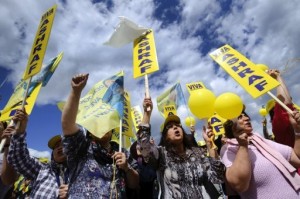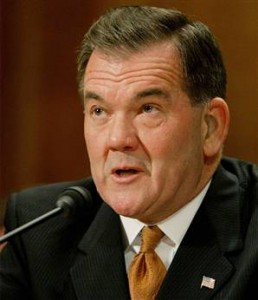AGENCE FRANCE PRESSE
PARIS — The leader of an exiled Iranian opposition movement claimed Sunday that moves to close a camp in Iraq housing thousands of her supporters were part of a plot by Tehran to have them killed.
Maryam Rajavi, France-based leader of the People’s Mujahedeen Organisation of Iran, said the Iraqi government’s plan to move Iranian exiles from Ashraf, north of Baghdad, had been secretly ordered by Iran’s Islamic government.
“Relocating residents of Ashraf inside Iraq is a crime against humanity and is a prelude to a grand massacre that has been devised by the Iranian theocratic fascist rulers and the government of Iraq,” she alleged.
“Forcible relocation of Ashraf residents is tantamount to sending them to their deaths and that is something they will never give in to,” she warned.
Rajavi heads both the National Council of Resistance of Iran, which claims to respresent the Iranian opposition, and its guerrilla wing, the PMOI, which has been on the US government’s list of terrorist groups since 1997.
While she and many of her supporters are based in France — and others are exiled around the world — the group’s biggest base is in Ashraf, where they are under pressure from the Iraqi government to pack their bags.
Talks are underway involving UN negotiators to find new homes for group members, who were housed in Iraq in the 1980s by the former regime of Saddam Hussein, but now find themselves unwelcome and pressured by Iraqi forces.
Baghdad wants to break up the group and send it to other camps around Iraq, but the PMOI — fearing expulsion to Iran — has demanded to be placed under the protection of US forces and resettled outside Iraq.
Rajavi said if Washington refused to do this “the only acceptable option for a relocation inside Iraq is the protection of Ashraf residents by UN Blue Helmet forces and a UN monitoring team stationed in the new location”.
Once international security was established for the exiles, they would be willing to negotiate their transfer to “third countries”, she said.
Last week, an Iraqi official told AFP that Baghdad plans to move the PMOI to another location, then for the United Nations to repatriate those with dual citizenship to their second countries and the rest to Iran or elsewhere.
Amid concerns that Iran would persecute returning members of a group it considers a dangerous terrorist outfit, the United Nations insists that repatriation to Iran would be only on a voluntary basis.
Ashraf residents have complained of increasing harassment by Iraqi forces since US-led forces ceased to protect it in January 2009, but the Baghdad government insists it is only enforcing its sovereignty.

